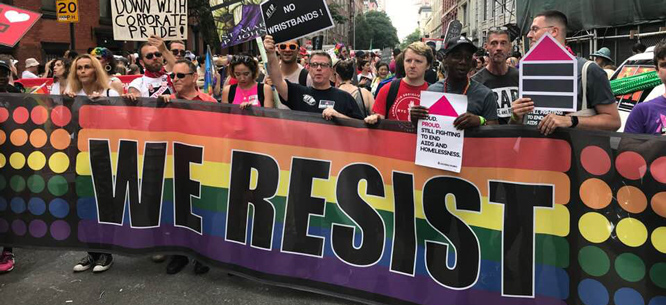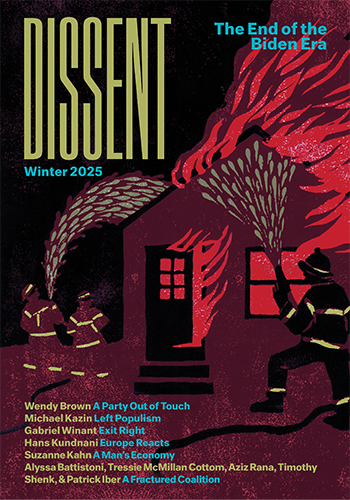The Far-Right Roots of “Straight Pride”
The Far-Right Roots of “Straight Pride”
The announced parade is the latest right-wing effort to seize the pathos of victimhood from the actually marginalized. Organizers around Boston have shown the greater strength that lies in solidarity.

Boston has made the national news for making an old joke a reality: three men applied to the city for a permit to mount a “Straight Pride” parade. Announced in the first week of (actual, Gay) Pride month, the parade inspired comments ranging in tone from enraged to bemused. The story sputters on, despite the fact that the event, if it happens at all, isn’t until late August. Brad Pitt threatened legal action after the organizers claimed he was their mascot; alt-right provocateur Milo Yiannopoulos took on the mantle of grand marshal (then promptly bailed on a press conference).
Most of the discourse surrounding this planned event has been derisory, and for obvious reasons. But if there’s anything that the Trump era has shown us, it’s that absurdity and risks to real human lives can and often do coexist. Often lost in the social media shooting gallery is the fact that the “straight pride” parade is the latest of several rebranding efforts of the Boston-area far right. The last time they made headlines was in August 2017. A coalition of far-right groups had scheduled a rally in conjunction with several organizers of “Unite the Right” before it collapsed into murderous violence in Charlottesville. Despite scrambling to separate themselves from the killing of Heather Heyer, the right-wingers found themselves surrounded by a crowd of 45,000 counter-protesters and were evacuated from Boston Common by the police. “Fight Supremacy,” called by three local black women, was the signal national response to the “Unite the Right” rally.
There were numerous ripple effects of the Fight Supremacy counter-protest. One was that far-right organizers throughout the country needed to craft a new public image. “Alt-right,” a label with which they were relatively comfortable in early 2017, was now associated with violence and ignominious failure. Media creatures like Yiannopoulos and Gavin McInnes backed away sharply from a label they had once embraced.
The far right in New England rebranded too. The group “Resist Marxism” formed to pick up the pieces left after August 2017. Resist Marxism presents itself as a group of mainstream conservatives, rallying for things like free speech and gun rights, but their efforts have failed. Between their fascist links; leaks from their organizing chats rife with racism, misogyny, and anti-Semitism; and their intimidation of immigrant rights, trans, and democratic socialist groups, what they are has always been clear.
Resist Marxism has never risen above gadfly status. Memory of their massive defeat at the hands of Fight Supremacy soured much of far-right New England on street demonstrations. Numerous internal divisions hampered their work, as did the distinct lack of charisma and planning ability on the part of its leadership. But perhaps the biggest reason for their failure to take off is the pressure kept up on them by left organizers, who made it clear that they would not go unopposed—generally through noisy (though nonviolent) counter-protest along with defenses for leftist events. People from across the socialist and anarchist spectrum in Boston and Providence undertook the work of keeping the public informed about and mobilized against Resist Marxism’s actions. This has been a promising example of left unity organized around a shared value and dedication to task.
Homophobia and transphobia are central to the contemporary far right. It is both a special concern of the alt-right—which grew at the same time as a broadening recognition of trans lives—and a unifying factor with the mainstream right, for whom homophobic and transphobic dog whistles have joined a preexisting array of racial signals. They hold to a narrowly defined ideal of masculinity that gay and especially trans life threaten when lived out in the open. Transphobia in particular is never far from Resist Marxism’s messaging, as shown when they attempted to crash and intimidate a rally put on by trans youth in Boston in October 2018. This took place in conjunction with the campaign against ballot question 3 in Massachusetts that year, which confirmed the state’s existing protections for trans people and passed resoundingly despite a scare campaign backed by Resist Marxism along with other, larger actors.
Grievance plays a key role on the contemporary right, both mainstream and hardcore, and weaponization of that sense of grievance on the part of privileged people has proven to be dangerous. “Straight Pride” is just the latest (and arguably the lamest) in the ongoing right-wing effort to seize the pathos of victimhood from the actually marginalized. The contemporary right is borderline sociopathic in terms of its inability to empathize, but right-wing organizers can read media signals. They can’t put themselves in the situations of marginalized people attempting to be seen and to express solidarity. But they can instantly see the shallowest and most squalid possibilities of identity politics: that claims to victimhood motivate and, more important, excuse, due to the different standards the oppressed are held to compared to the comfortable. Aggrieved white manhood has proven to be a potent motivator and excuse for horror, as numerous mass killings undertaken by radicalized white men—targeting groups like Muslims, Jews, and women—show.
Corey Robin has written eloquently of the sense of loss that animates much of reactionary thought. If the pathos of the exiled French aristocracy had an element of tragedy to it and the bathos of Americans lamenting a lost 1950s or 1980s utopia is a farce, “straight pride” is sub-farce—a cartoon of reaction. As always, it’s hard to tell how much its backers mean it and how much it’s just an excuse, but it’s increasingly evident that it doesn’t matter, with this or any of their other facades. Dunking on them on Twitter is fun, but the real world violence and shame that still haunt marginalized communities can’t be abated with jokes. This is part of the reason we have Pride in the first place. As the people of Boston showed in August 2017 and after, it’s showing up that makes the far right stand down. Wherever fascists try to take the street, that’s where the people need to meet them, to make clear where we stand. If the “straight pride” parade goes ahead, we will be there.
Peter Berard is a writer and organizer. He lives in Watertown, Massachusetts, and blogs at toomuchberard.wordpress.com.




